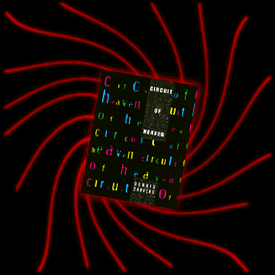 The hero, Nemo, who falls in love with her, thinks she looks and sings like Aimee Mann, and in a nightclub in the Bin, she sings one of Mann's songs to him. But Aimee Mann is a real singer/songwriter who lives in this, our carbon-based reality outside the novel. "Obviously I like Aimee Mann," Danvers laughs. "And it was quite complicated getting all the permissions to use her song here. That was almost as much trouble as writing the novel. I wanted to make the musical personage Justine was emulating real; not exactly a household word, but that if a reader wanted to check it out, he'd find there is such a person."
The hero, Nemo, who falls in love with her, thinks she looks and sings like Aimee Mann, and in a nightclub in the Bin, she sings one of Mann's songs to him. But Aimee Mann is a real singer/songwriter who lives in this, our carbon-based reality outside the novel. "Obviously I like Aimee Mann," Danvers laughs. "And it was quite complicated getting all the permissions to use her song here. That was almost as much trouble as writing the novel. I wanted to make the musical personage Justine was emulating real; not exactly a household word, but that if a reader wanted to check it out, he'd find there is such a person."
The imagined future of Circuit of Heaven is the third novel in which Danvers intertwines levels of fantasy and reality. His first novel, Wilderness, is a werewolf story in which he tried to go against the grain of the old Lon Chaney stereotype. To render his characters accurately, for instance, Danvers did prodigious research on wolves, going up to the Algonquin Provincial Park in Canada, which probably has the largest population of protected wolves left in the world. "I made the wolf's identity a genetic mutation," he says. "I made her a woman. When she turns into a wolf, I wanted her to act like a wolf, and to deal with it as an intelligent woman would. It was true to science in terms of how wolves interact."
Danvers' second novel, Time and Time Again, explores reincarnation across three centuries, but despite the otherworldly theme, the literary fabric feels real.. "I created a character who remembers his past lives, and in his case, remembering them has been awfully bad," says Danvers. "I had a writing teacher who said 'Only trouble is interesting.' So I've created a mess for this character."
Danvers grew up in Texas and received his BA, MA, and Ph.D. in English from the University of Texas at Arlington, and MFA at Virginia Commonwealth University in Richmond, where he now lives. He played in a rock & roll band in college, and still plays guitar for pleasure. "I wanted to be a writer the way another kid might think he wanted to be an astronaut," he recalls. "My first memory of writing fiction was in the third grade. The teacher asked us to write a tall tale and I wrote about a giant raccoon, and that made everybody laugh. I got my first taste of an audience."
Danvers pursued his dream through a series of jobs that gave him the flexibility to write. He worked as a college English teacher; in the restaurant business as a manager, bartender, and cook; and as a used book store manager, among other things. "I probably submitted my first short story when I was 18," he says, and Wilderness was accepted when I was over 40. Like many writers, I had a lot of stories in the mail at the same time, so while Wilderness was being considered by Simon & Schuster, four of my stories got accepted. It was as if my stars had changed."
To write Circuit of Heaven Danvers read many proposals for transferring consciousness into silicon, "radical speculations," he says of them. "I was struck by how nobody's looking into the ethical and philosophical implications, so I thought it might be a worthy topic to explore. Is the Bin a logical conclusion to the way technology and culture are evolving? "I don't think humans are necessarily antagonistic to the natural world," Danvers replies. "But I think we are in some ways withdrawing from it. You see it in the ways the cities are abandoned for the suburbs, and then the suburbs become walled communities. You see it in the fact this EOS convention is online. As this technology increases in power we'll be able to have experiences in which we go nowhere, literally. If the virtual experience can become utterly convincing, if there's no difference as far as perception is concerned, you start having serious applications, such as virtual immortality, which will be very seductive to people. As this technology develops we will increasingly participate in our own evolution."
What about the minority who stay outside? "The real world might be better with a little less strident human presence," he concludes. "One thing I like about Richmond is that a river runs through it, the James. We're relatively blessed it's not developed as a tourist attraction. It's a beautiful river with parks and public lands."
Danvers's upcoming novel, End of Days, takes place some years after the Circuit story; the Bin is still part of the landscape, but the characters are new.
|

